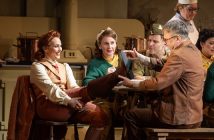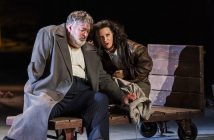Don Giovanni has always been a problematic character. Is he a vile seducer and a murderer? Or is he a clever rogue who breaks a few hearts along the way? Is Mozart presenting us with a tragedy where the wicked get their just desserts – in this case, hellfire? Or is it more a comedy, a dramma giocosa as Mozart described it, just as he described the far sunnier Marriage of Figaro?
In Richard Jones’s latest interpretation at the ENO, Christopher Purves plays him as a smoker, a drinker, a womaniser and, of course, a killer. He cares for no one and follows no one else’s rules. He never repents. Unsmiling, middle aged, in his shiny suit and shaven head, this Don is not how most of us picture the great seducer. But seduction plays only a small part here. In fact, while the dark chords and chromatics of this most wonderful of overtures is playing, the Don stands with his comic sidekick Leporello in a corridor as a woman dressed in black, appears. Leporello opens a door, the two disappear for a few seconds, reappear and the next woman arrives. There are a dozen or so, maybe twenty? I lost count. So not so much seduction, more servicing.

From this, we are pitched suddenly into the start of the story. The corridor opens up to reveal two bedrooms. One is Donna Anna’s where the Don has seemingly been invited and where Donna Anna seems to be interested in a game that involves a mask and a dagger. The game is interrupted by Donna Anna’s father, the Commendatore, who has been spending his evening with a prostitute in the bedroom across the corridor. Believing his daughter is being attacked, he challenges Giovanni who kills him with the dagger.
So, what’s going on here? The Commendatore, generally a pillar of rectitude, should surely not be in baggy underpants cavorting with a hooker. And in Donna Anna’s room, isn’t this a resisted seduction, even a rape? She is not usually so keen to join in with the Don’s plan. But then in this Don, no one is quite as first seems, few are recognised, everyone is self-absorbed and alone. Shapes shift.

So Anna is soon back with her fiancé Ottavio, discovering her father’s body and making Ottavio swear to avenge the death and find the killer. Whoever that might be. Don’t ask Donna Anna. In the meantime, Donna Elvira recently jilted by Don Giovanni reappears to remonstrate with him but, bored, he tells Leporello to deal with her. He does so by giving her a list of the Don’s conquests – in Spain alone it is 1003. Clive Bayley (resplendent in a ginger wig and another shiny suit) gives a fine black comic performance, here in patter style for the catalogue aria and later switching from dry deadpan humour to full-on clown, with ventriloquist dummy along the way.
A few hours later and Don Giovanni and Leporello come across the wedding of Zerlina and Masetto and, naturally, the Don decides to seduce the bride. This looks like it’s going to be surprisingly easy but Elvira is still in hot pursuit and then Anna and Ottavio turn up and a sudden bright light is turned on in Anna’s consciousness – she realises the Don is her seducer and her father’s murderer. The Don is now a wanted man (posters go up everywhere) and he forces Leporello to swap identities – a simple matter of that ginger wig and some glasses. This fools everyone including Elvira who thinks Leporello is her husband (the real one is busy seducing her maid), Anna, Ottavio, Zerlina and Masetto.

Later still when the Don, utterly without remorse, tells Leporello to invite the Commendatore’s statue for dinner, it accepts and arrives intending to drag the Don down to hell. Giovanni is as defiant, remorseless – and resourceful – as ever. No spoilers here, but this is a clever surprise ending totally in keeping with this production.
And it’s a production that is truly musically excellent. The orchestra under Mark Wigglesworth performs superbly and doesn’t put a foot wrong. All of the singers are good, too. Christopher Purves is an unsmiling, unsettling, icy Don in great voice. Allan Clayton as Ottavio had a deserved ovation for his two arias. Christine Rice was a superb Elvira and Mary Bevan a vibrant Zerlina without the silliness that often characterises her. James Creswell’s strong bass made for a memorable Commendatore and the American soprano Caitlin Lynch had an outstanding UK debut as Anna. And the often sidelined Masetto was given real musical and dramatic interest by Nicholas Crawley. As Leporello, Clive Bayley was in danger of stealing the show.
This is a dark, even cynical interpretation in some ways. There are a few tricks to pull the audience in making us complicit with the coldness, the duplicity, the heartlessness. At times, the characters seem mere cyphers. But it is also very funny. The set – bare and drab and mostly consisting of doors – has its own choreography and all those doors opening and closing have something of the French farce about them. As the Don leads Zerlina to one of them, it opens to reveal Masetto. In another scene, he gets her as far as the bedroom – but Elvira pops up in the bed. Maybe in spite of the updating, the unlikely Don, the spin on the characters and plot, this comes pretty close to Mozart’s dramma giocosa after all. I think he might find the ending surprisingly to his taste.
The English National Opera’s production of Don Giovanni at the London Coliseum until 26 October 2016. For more information and tickets please visit the website.




